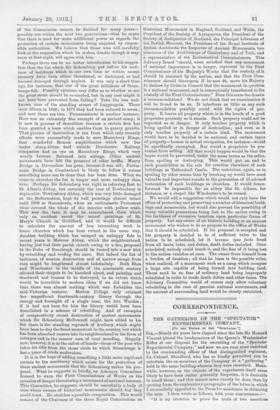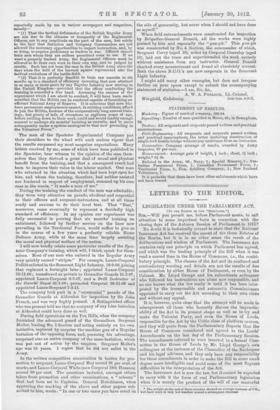CORRESPONDENCE.
THE GATHERING OF THE "SPECTATOR"' EXPERIMENTAL COMPANY.
[To rs EDIT011 OP THE " &POTATO&"] SIR,—Nearly six years have elapsed since the late Sir Howard Vincent placed the headquarters of the Queen's Westminster Rifles at our disposal for the recruiting of the "Spectator Experimental Company," and now we are once more indebted to the commanding officer of that distinguished regiment, Lt.-Colonel Shoolbred, who has so kindly permitted you to entertain the ex-members of the Company at a " gathering " held in the same building wherein they were recruited. Mean. while, however, as the objects of the experiment itself seem likely to have been rather generally forgotten, it is desirable to recall them ; and this cannot more exactly be done than by quoting from the explanatory paragraphs of the letter in which I successfully appealed to the Press for assistance in obtaining the men. I then wrote as follows, with your concurrence :-
"It is my intention to prove the truth of two assertions
repeatedly made by me in various newspapers and magazines, namely- " (1) That the tactical deficiencies of the British Regular Army are not due to the idleness or incapacity of the Regimental Officers, nor to any ineptitude on the part of the men, but solely to the fact that Battalion and Company Commanders are not allowed the necessary opportunities to impart instruction, and, by No doing, to acquire proficiency as leaders in war. Officers cannot train men whom they are seldom permitted even to see. If we want a properly trained Army, the Regimental Officers must be allowed to do their own work in their own way, and be judged by results. Such has not been the case in the British Army since the days when the drill of the barrack square represented also the tactical evolutions of the battle-field.
" (2) That it is perfectly feasible to train raw recruits in six months up to a standard of efficiency exceeding that now attained in as many or more years by any Regular Infantry now serving in the United Kingdom—provided that the officer conducting the training is conceded a free hand. Assuming the success of the experiment which I am about to conduct, it will have been made manifest that the Militia can be rendered capable of furnishing an efficient National Army of Reserve. It is notorious that men who have permanent employments cannot, in existing conditions, afford to join the Militia, because of the comparatively long annual train- ings ; but plenty of lads of seventeen or eighteen years of age, before settling down to their work, could and would readily enough consent to undergo six months' training as recruits, and to serve subsequently under a system analogous to that now prevailing in the Volunteer Force."
The men of the Spectator Experimental Company put their shoulders to the wheel with such zealous vigour that the results surpassed my most sanguine expectations. Many letters received by me, some of which have been published in the Spectator, bear witness to the opinion of the men them- selves that they derived a great deal of moral and physical
benefit from the training, and that a consequent result had
been to improve their value in the labour market. One man who returned to the situation -which bad been kept open for him, and whom the training, therefore, had neither assisted nor hindered in respect of employment, summed up his own case in the words, " It made a man of me."
During the training the conduct of the men was admirable; they were very attentive on parade, obedient and respectful to their officers and sergeant-instructors, and at all times ready and anxious to do their level best. That "Best," moreover, came eventually to represent a decidedly high standard of efficiency. In my opinion our experiment was fully successful in proving that six months' training on enlistment, followed by further service on the lines now prevailing in the Territorial Force, would suffice to give us in the course of a few years a perfectly reliable Home Defence Army, while at the same time largely assisting the moral and physical welfare of the nation.
I will now briefly relate some particular results of the Spec- tator Company's training, which will, I think, speak for them-
selves. Most of our men who enlisted in the Regular Army very quickly earned " stripes." For example, Lance-Corporal Pollitt enlisted in the Somerset Light Infantry, 30-9-06, joining that regiment a fortnight later ; appointed Lance-Corporal
16-11-06 ; transferred as private to Grenadier Guards 15-2-07; appointed Lance-Corporal 9-7-07, and a Drill Instructor at the Guards' Depot 31-1.08; promoted Corporal 28-11-09 and appointed Lance-Sergeant 7-3-11.
The company took part in a " ceremonial " parade of the Grenadier Guards at Aldershot for inspection by Sir John French, and was very highly praised. A distinguished officer who was present told me that no company of any Line battalion at Alderehot could have done so well.
During field operations on the Fox Hills, when the company furnished the advanced guard of the Grenadiers, Sergeant Moller, leading No. 1 Section and acting entirely on his own initiative, captured by surprise the machine gun of a Regular battalion of the opposing force, and, pursuing his advantage, surprised also an entire company of the same battalion, which was put out of action by the umpires. Sergeant Moller's age was 19 years. I regret that ho did not enlist in the Army.
In the written competitive examination in tactics for pro- motion to sergeant, Lance-Corporal May scored 91 per cent. of marks, and Lance-Corporal White (now Corporal 19th Hussars) scored 89 per cent. The questions included, amongst others taken from promotion and other examinations, a " scheme" that had been set to Captains. General Hutchinson, when approving the marking of the above and other papers sub- mitted to him, wrote " In one or two cases you have erred on
the side of generosity, but never when I should not have done so myself."
When field entrenchments were constructed for inspection by Brigadier-General Donald, all the works were highly praised by him and especially the "gun-pit." This gun-pit was constructed by No. 4 Section, the commander of which, Sergeant Curry (aged 19), aided by Corporal Croweley (aged 18), laid out the trace and auperintended the work entirely without assistance from any instructor. General Donald checked every measurement and found all absolutely correct. Both the above N.C.O.'s are now corporals in the Somerset Light Infantry.
I might add many other examples, but dare not trespass further on your space except to submit the accompanying statement of statistics.—I am, Sir, &c.,
A. W. A. PoLLocn, Lt -Colonel, Wingfield, Godalming. Late Com. B.E.O.
STATEMENT OF RESULTS.
Musketry : Figure of merit of company, 196.84, Signalling : Number of men qualified in Morse, 42; in Semaphore, 83.
Tactics: All sergeants and corporals passed written and practical examinations.
Field-Engineering All sergeants and corporals passed written and practical examinations, the latter including construction of single-lock trestle bridge without any assistance from an instructor. Gymnastics : Company average of marks, awarded by Army inspector, 87 per cent. Measurements : Average gain of height, I inch ; chest, 1 inch ; weight,* 6i lb.
Enlisted in the Army, 98 ; Navy, 1 ; Special Reserve, 1 ; Aus- tralian Permanent Force, 1; Canadian Permanent Force, 1; Territorial Force, 2; Hon. Artillery Company, 1; New Zealand Volunteers, 1.
It is probable that there have been other enlistments which have not been traced.











































 Previous page
Previous page